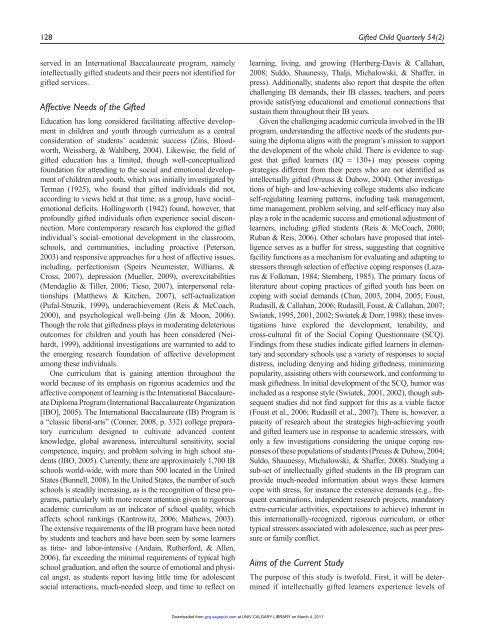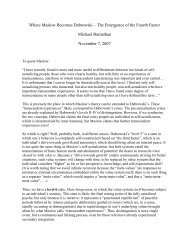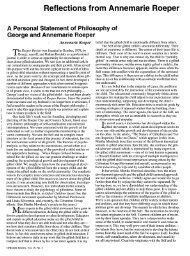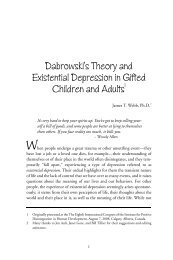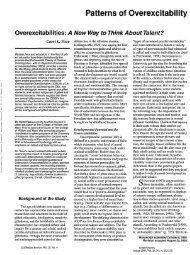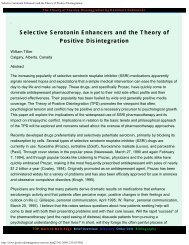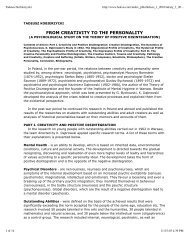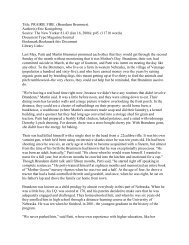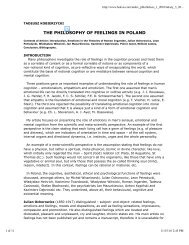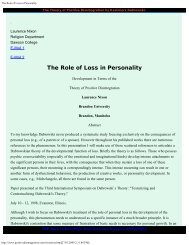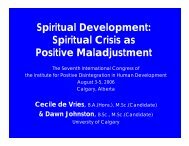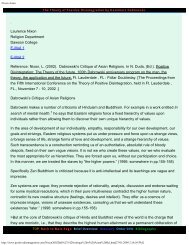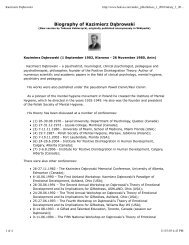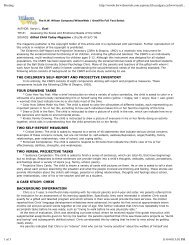Strategies Used by Intellectually Gifted Students to Cope With Stress ...
Strategies Used by Intellectually Gifted Students to Cope With Stress ...
Strategies Used by Intellectually Gifted Students to Cope With Stress ...
Create successful ePaper yourself
Turn your PDF publications into a flip-book with our unique Google optimized e-Paper software.
128 <strong>Gifted</strong> Child Quarterly 54(2)<br />
served in an International Baccalaureate program, namely<br />
intellectually gifted students and their peers not identified for<br />
gifted services.<br />
Affective Needs of the <strong>Gifted</strong><br />
Education has long considered facilitating affective development<br />
in children and youth through curriculum as a central<br />
consideration of students’ academic success (Zins, Bloodworth,<br />
Weissberg, & Wahlberg, 2004). Likewise, the field of<br />
gifted education has a limited, though well-conceptualized<br />
foundation for attending <strong>to</strong> the social and emotional development<br />
of children and youth, which was initially investigated <strong>by</strong><br />
Terman (1925), who found that gifted individuals did not,<br />
according <strong>to</strong> views held at that time, as a group, have social–<br />
emotional deficits. Hollingworth (1942) found, however, that<br />
profoundly gifted individuals often experience social disconnection.<br />
More contemporary research has explored the gifted<br />
individual’s social–emotional development in the classroom,<br />
schools, and communities, including proactive (Peterson,<br />
2003) and responsive approaches for a host of affective issues,<br />
including, perfectionism (Speirs Neumeister, Williams, &<br />
Cross, 2007), depression (Mueller, 2009), overexcitabilities<br />
(Mendaglio & Tiller, 2006; Tieso, 2007), interpersonal relationships<br />
(Matthews & Kitchen, 2007), self-actualization<br />
(Pufal-Struzik, 1999), underachievement (Reis & McCoach,<br />
2000), and psychological well-being (Jin & Moon, 2006).<br />
Though the role that giftedness plays in moderating deleterious<br />
outcomes for children and youth has been considered (Neihardt,<br />
1999), additional investigations are warranted <strong>to</strong> add <strong>to</strong><br />
the emerging research foundation of affective development<br />
among these individuals.<br />
One curriculum that is gaining attention throughout the<br />
world because of its emphasis on rigorous academics and the<br />
affective component of learning is the International Baccalaureate<br />
Dip loma Program (International Baccalaureate Organization<br />
[IBO], 2005). The International Baccalaureate (IB) Program is<br />
a “classic liberal-arts” (Conner, 2008, p. 332) college prepara<strong>to</strong>ry<br />
curriculum designed <strong>to</strong> cultivate advanced content<br />
knowledge, global awareness, intercultural sensitivity, social<br />
competence, inquiry, and problem solving in high school students<br />
(IBO, 2005). Currently, there are approximately 1,700 IB<br />
schools world-wide, with more than 500 located in the United<br />
States (Bunnell, 2008). In the United States, the number of such<br />
schools is steadily increasing, as is the recognition of these programs,<br />
particularly with more recent attention given <strong>to</strong> rigorous<br />
academic curriculum as an indica<strong>to</strong>r of school quality, which<br />
affects school rankings (Kantrowitz, 2006; Mathews, 2003).<br />
The extensive requirements of the IB program have been noted<br />
<strong>by</strong> students and teachers and have been seen <strong>by</strong> some learners<br />
as time- and labor-intensive (Andain, Rutherford, & Allen,<br />
2006), far exceeding the minimal requirements of typical high<br />
school graduation, and often the source of emotional and physical<br />
angst, as students report having little time for adolescent<br />
social interactions, much-needed sleep, and time <strong>to</strong> reflect on<br />
learning, living, and growing (Hertberg-Davis & Callahan,<br />
2008; Suldo, Shaunessy, Thalji, Michalowski, & Shaffer, in<br />
press). Additionally, students also report that despite the often<br />
challenging IB demands, their IB classes, teachers, and peers<br />
provide satisfying educational and emotional connections that<br />
sustain them throughout their IB years.<br />
Given the challenging academic curricula involved in the IB<br />
program, understanding the affective needs of the students pursuing<br />
the diploma aligns with the program’s mission <strong>to</strong> support<br />
the development of the whole child. There is evidence <strong>to</strong> suggest<br />
that gifted learners (IQ = 130+) may possess coping<br />
strategies different from their peers who are not identified as<br />
intellectually gifted (Preuss & Dubow, 2004). Other investigations<br />
of high- and low-achieving college students also indicate<br />
self-regulating learning patterns, including task management,<br />
time management, problem solving, and self-efficacy may also<br />
play a role in the academic success and emotional adjustment of<br />
learners, including gifted students (Reis & McCoach, 2000;<br />
Ruban & Reis, 2006). Other scholars have proposed that intelligence<br />
serves as a buffer for stress, suggesting that cognitive<br />
facility functions as a mechanism for evaluating and adapting <strong>to</strong><br />
stressors through selection of effective coping responses (Lazarus<br />
& Folkman, 1984; Sternberg, 1985). The primary focus of<br />
literature about coping practices of gifted youth has been on<br />
coping with social demands (Chan, 2003, 2004, 2005; Foust,<br />
Rudasill, & Callahan, 2006; Rudasill, Foust, & Callahan, 2007;<br />
Swiatek, 1995, 2001, 2002; Swiatek & Dorr, 1998); these investigations<br />
have explored the development, tenability, and<br />
cross-cultural fit of the Social Coping Questionnaire (SCQ).<br />
Findings from these studies indicate gifted learners in elementary<br />
and secondary schools use a variety of responses <strong>to</strong> social<br />
distress, including denying and hiding giftedness, minimizing<br />
popularity, assisting others with coursework, and conforming <strong>to</strong><br />
mask giftedness. In initial development of the SCQ, humor was<br />
included as a response style (Swiatek, 2001, 2002), though subsequent<br />
studies did not find support for this as a viable fac<strong>to</strong>r<br />
(Foust et al., 2006; Rudasill et al., 2007). There is, however, a<br />
paucity of research about the strategies high-achieving youth<br />
and gifted learners use in response <strong>to</strong> academic stressors, with<br />
only a few investigations considering the unique coping responses<br />
of these populations of students (Preuss & Dubow, 2004;<br />
Suldo, Shaunessy, Michalowski, & Shaffer, 2008). Studying a<br />
sub-set of intellectually gifted students in the IB program can<br />
provide much-needed information about ways these learners<br />
cope with stress, for instance the extensive demands (e.g., frequent<br />
examinations, independent research projects, manda<strong>to</strong>ry<br />
extra-curricular activities, expectations <strong>to</strong> achieve) inherent in<br />
this internationally-recognized, rigorous curriculum, or other<br />
typical stressors associated with adolescence, such as peer pressure<br />
or family conflict.<br />
Aims of the Current Study<br />
The purpose of this study is twofold. First, it will be determined<br />
if intellectually gifted learners experience levels of<br />
Downloaded from gcq.sagepub.com at UNIV CALGARY LIBRARY on March 4, 2011


